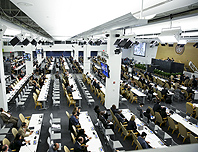The Second Committee (economic and financial matters) began its work on 9 October and has concluded its traditional general debate on Friday, 11 October. Key issues emerging from the debate comprised the implementation of the MDGs and the outcomes of Rio+20 and elaboration of the post 2015 development agenda.
The Second Committee began its work under the Chairmanship of H.E. Mr. Abdou Salam Diallo, Permanent Representative of Senegal with an organizational meeting and the election of its bureau. This was followed in the afternoon with statements by the Chairman, the USG of UN DESA, delivered on his behalf by Ms. Shamshad Akhtar, ASG of UN DESA, and a key note address by Professor Chetty of Harvard University (see article in Capacity development section).
The traditional general debate of the Second Committee was concluded on Friday 11 October 2013. Over ninety speakers participated in the debate, eight of them representing country groups (G77 and China, EU, ASEAN, LDCs, LLDCs, AOSIS, CARICOM and CELAC).
The key issues that emerged in the presentations and the debate are below:
- The analysis of economic and social policy is being transformed by new data and methods, as opposed to traditional theory-driven study of macro questions. Thus improving micro-level policy decisions can have great macro-level impacts, and harnessing big data can provide the evidence base for designing many sustainable development policies.
- The world economy was in a state of flux, driven by uncertainty and risk. Five years after the global economic and financial crisis, most developed economies were experiencing sluggish recovery, while growth in emerging economies faced new challenges, including heightened volatility of international capital flows.
- The implementation of the MDGs and the outcomes of Rio+20 and the process for the elaboration of the post 2015 development agenda stood out as the priority issue.
- Climate change was seen as a critical challenge that needs singular attention, and was linked directly to poverty eradication and the achievement of sustainable development goals.
- World economic and financial situation and global economic governance, and international development cooperation were treated simultaneously, although there were clear differences in approach between developing and developed countries, especially regarding the cause and effect of the crisis.
- On trade, developing countries led the call for fair, transparent rule-based and development oriented trade outcomes in follow-up to the Doha Round. The debate set up high expectations for the upcoming Bali conference later in the year that many said should have a successful outcome.
- Countries in special situations and Africa, with the land-locked developing countries, the least developed countries, the Small Island Developing States and Africa, supported by a many countries, continued to advocate for the need to address their special circumstances and to support the upcoming conferences on their issues.
- The QCPR, with the emphasis that it should be implemented fully, and also with the messages that funding is linked to the effective delivery of operational activities, and that “delivering as one” still needs dedicated support.
The impact of globalization: challenges and solutions
 On 23 October, the Second Committee considered agenda item 21(a) on globalization and interdependence, including sub-item: The role of the United Nations in promoting development in the context of globalization and interdependence.
On 23 October, the Second Committee considered agenda item 21(a) on globalization and interdependence, including sub-item: The role of the United Nations in promoting development in the context of globalization and interdependence.
The report of the Secretary-General, prepared for agenda item 21(a), highlights the impact of globalization on the achievement of sustainable development and explores implications for a unified, universal, people-centered sustainable development agenda for the post-2015 era. The report highlights several challenges and offers policy recommendations to address them. Ms. Shamshad Akhtar, Assistant Secretary General for Economic Development, UN DESA, introduced the report of the Secretary-General (A/68/259) on this agenda item.
In particular, the report notes that the effectiveness of multilateralism should be enhanced to fully realize the opportunities created by globalization and minimize and manage its costs and risks. The United Nations could further promote multilateral coordination, coherence and accountability in the post-2015 era. Therefore, the proper functioning of the institutional framework for the review and follow-up work in the General Assembly and the Economic and Social Council, including the new High-level Political Forum, will be essential. There is also need for a longer-term strategy for repositioning the UN development system to address current global realities and emerging challenges and interdependencies in such dimensions as function, funding, capacity, partnerships, organizational arrangements and governance.
Shaping globalization to ensure benefits for everyone
Many delegations addressed these issues in their interventions, including representatives of the G77 and China, CARICOM, ASEAN, and the African Group. Delegates stated that globalization should be shaped to ensure that it benefits everyone by using a multilateral approach. The UN should promote coherence of review and follow up and greater coordination. The focus on middle-income countries in the report was welcomed by several Member States.
Several Member States called for a renewed global partnership to address the challenges of globalization. Delegates emphasized that international trade does not always lead to sustainable development. Trade must also be equitable, and a rules-based global trading system will help achieve more balanced development. The G77 and China also voiced their concern with the lack of access to technology by developing countries and stressed that technology transfer should be facilitated through multilateral partnerships.
Delegations also emphasized that coherent international policy support is required for the post-2015 development agenda. Multilateralism, as well as global governance, will need to be strengthened, along with strong multilateral institutions, to ensure that the post-2015 global development agenda, facilitated by an inclusive multilateral system, will be able to distribute globalization benefits for everyone.
The Secretary-General report on The role of the United Nations in promoting development in the context of globalization and interdependence: http://daccess-dds-ny.un.org/doc/UNDOC/GEN/N13/417/00/PDF/N1341700.pdf
The Second Committee of the 68th General Assembly: http://www.un.org/en/ga/second/index.shtml

